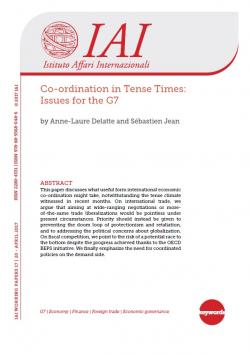Co-ordination in Tense Times: Issues for the G7
This paper discusses what useful form international economic co-ordination might take, notwithstanding the tense climate witnessed in recent months. On international trade, we argue that aiming at wide-ranging negotiations or more-of-the-same trade liberalizations would be pointless under present circumstances. Priority should instead be given to preventing the doom loop of protectionism and retaliation, and to addressing the political concerns about globalization. On fiscal competition, we point to the risk of a potential race to the bottom despite the progress achieved thanks to the OECD BEPS initiative. We finally emphasize the need for coordinated policies on the demand side.
Paper presented at the international conference on “Major Challenges for Global Macroeconomic Stability. The Role of the G7”, organized in Rome on 27-28 March 2017 by the Istituto Affari Internazionali (IAI) with the support of the Italian Ministry of Foreign Affairs and International Cooperation and the Bank of Italy.
-
Details
Roma, IAI, April 2017, 20 p. -
Issue
17|20 -
ISBN/ISSN/DOI:
978-88-9368-048-6
Introduction
1. International trade
1.1 Slow, unpopular and contentious: the bleak prospects of international trade
1.2 Priorities for a co-ordination agenda
1.2.1 Preventing the raise of protectionism and trade conflicts: so far, so good, but it may not last
1.2.2 China’s new status calls for political negotiations
1.2.3 Addressing concerns about globalization
2. Profit shifting and tax competition
2.1 Why is the taxation of multinational corporations (MNCs) still on the international agenda?
2.2 Why is G7 coordination required for the taxation of multinational corporations? The BEPS three years later
2.3 Unilateral tax reforms
3. Macro-coordination
Conclusion
References



